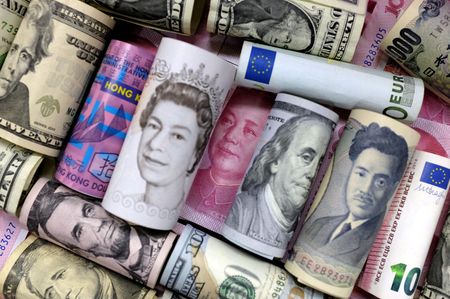By Lawrence Delevingne and Alun John
BOSTON/LONDON (Reuters) -Technology stocks regained ground on Tuesday, a day after a low-cost Chinese AI model rattled markets, while traders rotated back into the dollar from safe-haven currencies.
The tech rebound boosted Wall Street’s main stock indices, with Nasdaq adding about 2% and chip giant Nvidia up 9%. The S&P 500 gained about 0.9% and the Dow Jones Industrial Average rose 0.3%. [.N]
Nasdaq shares tumbled on Monday as Nvidia fell 17%, losing nearly $593 billion of its value in the biggest one-day market capitalization loss in history. Behind the rout was the emergence of a low-cost Chinese artificial intelligence model, DeepSeek, which made investors question the dominance of AI bellwethers and their suppliers.
“The market’s initial response has been ‘sell first, understand later,'” said Stuart Dunbar, a partner at investment firm Baillie Gifford.
“Short-term news flow and price moves don’t invalidate the potentially profound impact AI will have on the world. The advent of a much cheaper lightbulb didn’t signal bad news for lightbulb manufacturers or electricity companies.”
Investors’ reassessment of developments in the AI sector will also heighten investor interest in this week’s earnings at Microsoft, Tesla and Meta. Executives can expect to be asked whether they still plan to spend so much on computing power.
Tuesday’s earnings highlights included Boeing, whose shares rose about 1.5% even after the plane maker reported its biggest annual loss since 2020.
Shares in General Motors <GM.N> meanwhile fell around 9% as investors weighed the threat of tariffs even as the carmaker posted results and an earnings forecast ahead of expectations.
European tech stocks stabilized on Tuesday and the broad STOXX 600 share benchmark hit a new intraday high, a sign of how strongly shares have been performing in recent weeks. [.EU]
Japan’s Nikkei share average fell more than 1% on Tuesday as heavyweight chip-related stocks tracked an overnight drop in the Nasdaq index, but gains in bank shares helped the Topix trim early losses. [.T]
DON’T FORGET TARIFFS
Trade tensions over U.S. President Donald Trump’s policies remained in the mix, supporting the dollar and driving investors back out of Treasuries.
Trump still plans to make good on his promise to issue tariffs on Canada and Mexico on Saturday, a White House spokesperson told reporters on Tuesday. The spokesperson said Trump is also still weighing fresh tariffs on China for Saturday. Trump said last week he would announce 25% tariffs on Mexico and Canada on Feb. 1 unless the countries help tackle the twin issues of U.S. fentanyl trafficking and immigration.
The euro was down about 0.6%, while safe-haven currencies, which had appreciated Monday, gave back their gains. The dollar was last up 0.6% on the Japanese yen and up 0.2% on the Swiss franc. [FRX/]
U.S. Treasuries, which rallied on Monday as part of the risk-off move, were little changed, with benchmark 10-year yields last trading at 4.538%. [US/]
Of note in European rates markets was the spread between French and German 10-year yields, which blew out last year on French political uncertainty. The spread narrowed to 72 bps, its tightest since mid November, as investors hope the current government may be able to pass a budget. [GVD/EUR]
There are also central bank meetings for bond and currency investors to grapple with. The Federal Reserve is expected to keep rates steady at its meeting which concludes on Wednesday, and the European Central Bank is expected to cut rates by 25 bps on Thursday.
U.S. consumer confidence weakened for a second straight month in January amid renewed concerns about the labor market and inflation, while a new report from the U.S. Commerce Department suggested business investment in equipment was poised to pick up in the first quarter.
Oil prices settled up on Tuesday, bouncing back from multi-week lows, after the White House reiterated its tariff plans for Canadian and Mexican imports.
Gold, which had slipped as investors liquidated bullion to cover losses, added 0.8% to $2,762 an ounce.
(Reporting by Lawrence Delevingne in Boston and Alun John in London. Additional reporting by Sinead Cruise. Editing by Ros Russell, Tomasz Janowski, Jan Harvey and Deepa Babington)










